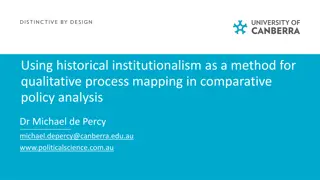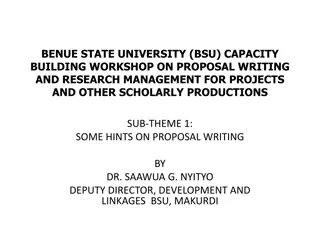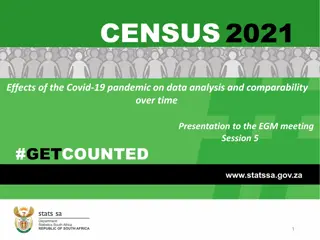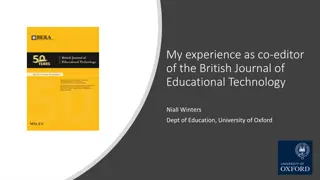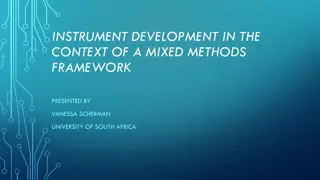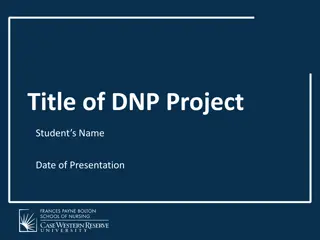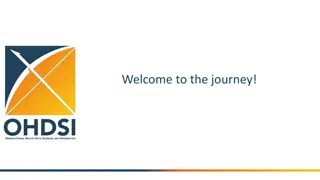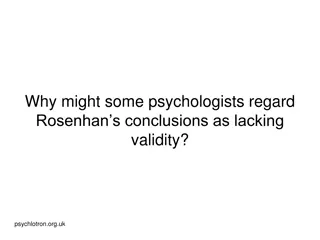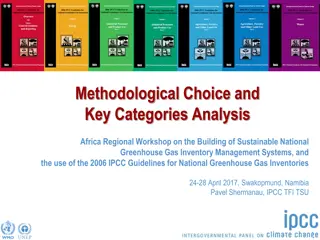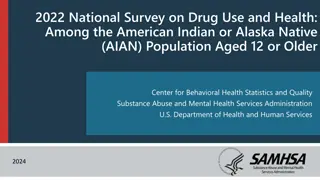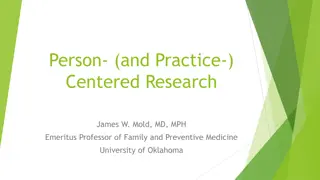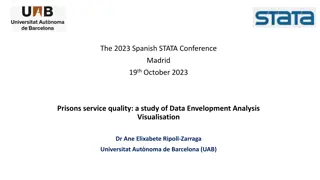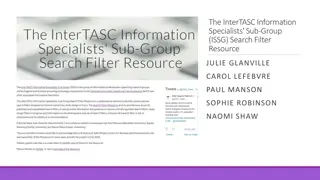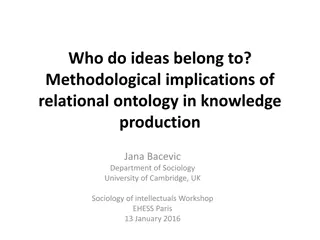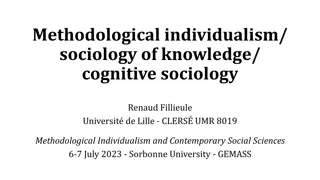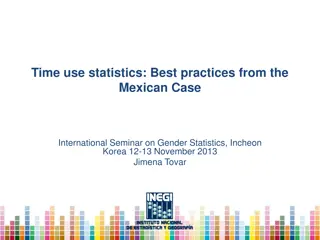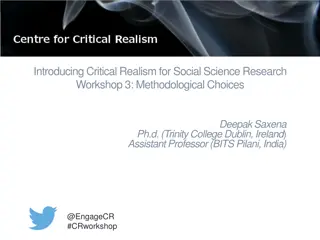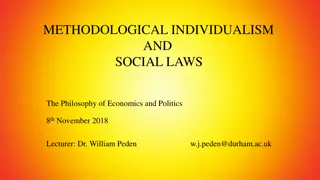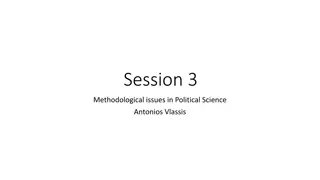Production & Service Systems Engineering Spring 2023
Methodological background for modeling workflow dynamics and resource allocation in modern operations, with a focus on production and service environments.
0 views • 30 slides
Balancing Political Field in Education Research
Analyzing the challenges of historical education research in politically contested fields, addressing methodological hurdles in meeting political demands for practical solutions. Can the history of education help evaluate policy and politics? Exploring the delicate balance between research objectivi
1 views • 9 slides
To be or not to be – ‘insider/outsider positionality’: Methodological challenges in researching a group of Iraqi Kurdish migrants in the UK.
Research by Chra R. Mahmud explores the methodological challenges in studying Iraqi Kurdish migrants in the UK, focusing on insider-outsider positionality. The study delves into the lived experiences of this group, examining the researcher's status and identity negotiation during the research proces
0 views • 18 slides
Courses and Training on Child Welfare and Family Support
The Melograno Training Courses focus on combining scientific and methodological skills with practical experience in managing a variety of services for individuals and families. Drawing from the expertise of professionals with extensive backgrounds in psychology, social work, education, and counselin
2 views • 32 slides
Methodological Video Analysis for Research Enhancement
Explore a series of methodological videos related to topics covered in class to enhance your understanding. Identify familiar information, new insights, and unclear concepts. Engage in self-assessment exercises to further reinforce your knowledge. Conclude with a session with the instructor for feed
0 views • 11 slides
Evolution of Development Communication: Theoretical Frameworks and Applications
Exploring the interdisciplinary field of Development Communication, this seminar delves into theoretical frameworks, methodological applications, and practical implications at the World Bank. It reflects on the evolution, theories, and practices underlying Development Communication paradigms, with a
4 views • 57 slides
MAIR Curriculum Overview and Academic Advising Services
The MAIR (Master of Arts in International Relations) program offers a comprehensive curriculum covering Leadership, Ethics, International Economics, Research Methods, and more. The program includes core courses, self-designed focus areas, and regional specializations. Academic advising services prov
0 views • 20 slides
Challenges and Solutions in Implementing Historical Competencies in Teaching
Explore the complexities and obstacles faced in implementing historical competencies in teaching, as discussed by Jens Aage Poulsen, a senior lecturer and researcher at HistoryLab, University College Lillebaelt, Denmark. The content delves into competence-based curriculum, core historical competenci
0 views • 7 slides
International Law of War: Nuremberg Principles and Accountability
The Nuremberg Principles, derived from the trials of Nazi officials for war crimes, establish accountability in international law. These principles hold individuals responsible for committing acts considered crimes under international law, regardless of their position or orders received. The assumpt
2 views • 22 slides
Institutionalism and Methodological Issues in Political Science
Institutionalism is a foundational concept in political science, emphasizing the study of governing institutions and their role in shaping political behavior. It explores inductive and deductive approaches to research, highlighting the significance of empirical evidence and theoretical assumptions.
0 views • 19 slides
Understanding Historical Institutionalism in Comparative Policy Analysis
Analyzing the methodological approach of historical institutionalism in qualitative process mapping for comparative policy analysis. Addressing the challenges, such as thick description and path dependency, and exploring techniques to overcome shortcomings through comparison over time, process traci
1 views • 12 slides
Effective Proposal Writing: Key Strategies for Securing Funding
Proposal writing is essential in academia for securing funding. This workshop at Benue State University shed light on the importance of persuading reviewers and addressing unspoken needs of funding agencies. Key elements such as conceptual innovation, methodological rigor, and rich substantive conte
1 views • 21 slides
Impact of COVID-19 on Data Analysis and Comparability Over Time
The COVID-19 pandemic has significantly affected data analysis processes, with changes in data items, census reference dates, and collection methodologies. This has led to challenges in maintaining comparability over time. The presentation covers the background, changes in data items, South African
0 views • 12 slides
Insights from Co-Editing the British Journal of Educational Technology
Co-editor's experience at the British Journal of Educational Technology, highlighting the journal's focus on theoretical perspectives, methodological developments, and empirical research in educational technology. Details on the publication process, criteria for submission, and key themes explored b
0 views • 19 slides
Instrument Development in the Context of Mixed Methods Framework
Explore the intricacies of instrument development within a mixed methods framework as presented by Vanessa Scherman from the University of South Africa. The overview delves into mixed methods research, methodological norms, and closing the loop in research processes. Gain insights into the pragmatic
2 views • 40 slides
Genetic Manipulation in Environmental Biotechnology
Genetic manipulation strategies in environmental biotechnology involve techniques like gene splicing and molecular cloning to modify genes directly. These methods have various applications such as isolating genes, producing specific molecules, improving biochemical production, creating organisms wit
0 views • 20 slides
Comprehensive Analysis of a Doctor of Nursing Practice Project
This project delves into a detailed examination encompassing introduction, literature review, methods, background, problem statement, study objectives, key frameworks, methodological overviews, results, sample analysis, discussions, implications for practice, education, policy, and research.
0 views • 23 slides
Analytic Versus Continental Philosophy in the 20th Century: A Comparative Overview
In 20th-century philosophy, the divide between Analytic and Continental schools deepened but has seen recent attempts at reconciliation. Analytic philosophy emphasizes logic, language, and epistemology, requiring technical expertise, while Continental philosophy rejects metaphysical speculation and
0 views • 15 slides
Empowering Health Decisions and Care through OHDSI Community Collaboration
OHDSI's mission revolves around improving health by empowering a community to generate evidence that enhances health decisions and care. The journey to real-world evidence involves leveraging patient-level data in source systems and establishing reliable evidence. The OHDSI community is dedicated to
0 views • 5 slides
Evaluating the Validity of Rosenhan's Conclusions in Psychology
Some psychologists question the validity of Rosenhan's conclusions due to methodological flaws in his study, such as lack of generalizability and potential biases. Critics argue that the findings may not accurately reflect real-world psychiatric settings, leading to skepticism about their applicabil
0 views • 250 slides
Embedded Research Conference Workgroup B: Management Decisions Support
Workgroup B at the Embedded Research Conference focuses on providing research support for management decisions. The participants aim to identify and prioritize operational questions that could benefit from embedded research, work productively within the existing QI ecosystem, and create an inventory
0 views • 14 slides
Exploring the Relationship Between Institutions and Substance in EU Competition Law
Delve into the intricate relationship between institutions and legal substance within EU competition law, shedding light on methodological challenges faced by legal scholars and the quest for a comprehensive database to provide valuable insights. The discussion navigates through the complexities of
0 views • 25 slides
Understanding Methodological Choice and Key Categories Analysis in Greenhouse Gas Inventory Management
Methodological choice and key categories analysis play a crucial role in managing uncertainties in greenhouse gas inventories. By prioritizing key categories and applying rigorous methods where necessary, countries can improve the accuracy and reliability of their emissions estimates. Key categories
0 views • 24 slides
Handbook on Integrating Business and Trade Statistics
The Handbook on Integrating Business and Trade Statistics aims to provide guidance on the integration of business and trade data to enhance policymaking and understanding the impact of globalization and international trade. It covers conceptual frameworks, methodological practices, and new indicator
0 views • 11 slides
Insights from 2022 National Survey on Drug Use and Health Among AIAN Population
The 2022 National Survey on Drug Use and Health provides comprehensive insights into substance use, mental health, and treatment services among the American Indian or Alaska Native population aged 12 and older. It covers a wide range of topics, including substance use disorders and the receipt of tr
1 views • 35 slides
Unveiling Narratives of Mothering Through UK Blog Posts on Family Feeding
Delve into the exploration of mothering practices narrated through UK blog posts on family feeding. Learn about the methodological and ethical implications of working narratively and multimodally with blogs. Discover how blogs document family life, everyday mothering practices, and food provisioning
0 views • 14 slides
Understanding Person-Centered Care in Healthcare Research
Explore the concepts of person-centered care in healthcare research, focusing on key differences from problem-oriented care, emerging research questions, methodological considerations, and implications for study populations, interventions, and outcomes. Learn about the definition of patient-centered
2 views • 52 slides
Efficiency Methodological Approaches in Prisons Service Quality Study
Exploring efficiency methodologies in analyzing prisons service quality, this study focuses on parametric and non-parametric approaches such as Data Envelopment Analysis (DEA) and Stochastic Frontier Analysis (SFA). It delves into benchmarking techniques, productivity analysis, and the implications
0 views • 21 slides
Enhancing Search Filters for Evidence Synthesis: The ISSG Search Filter Resource
Introduction: The ISSG Search Filter Resource provides methodological search filters for identifying studies of specific designs, aiding in evidence synthesis and guideline development. The site is produced through monthly searches in databases like CINAHL, Embase, and MEDLINE. It offers filters for
1 views • 8 slides
Understanding Relational Ontology and Knowledge Production in Sociology
This academic exploration delves into the concept of relational ontology and its methodological implications in knowledge production, focusing on the ownership of ideas and the role of intellectuals as knowledge producers. It discusses the foundational singularity, the generative significance of con
0 views • 12 slides
Exploring Methodological Individualism in Sociology of Knowledge
Delve into the concept of methodological individualism within the sociology of knowledge, as scholars like Renaud Fillieule and Raymond Boudon emphasize the importance of understanding collective beliefs through the lens of individualistic methodology. Classical works by Robert Merton further enrich
0 views • 24 slides
Interviewing Young Adults with Life-Limiting Conditions: Methodological Reflections
This study reflects on the methodological aspects of interviewing young adults with life-limiting conditions, emphasizing inclusive research practices. The research employs interpretive qualitative methods, focusing on unexpected consequences of pandemic control measures. Participants, including bot
0 views • 10 slides
Understanding FAIR Principles in Biomedical Research
The FAIR principles - Findable, Accessible, Interoperable, and Reusable - provide a framework for ensuring scientific data in biomedical research is managed and shared effectively. This informative session delves into the theory and practice of FAIR principles, emphasizing the importance of data qua
0 views • 28 slides
Understanding Time Use Statistics in Mexico: Best Practices and Methodological Insights
Exploring the methodological features, surveys conducted, representativity considerations, and basic concepts underlying time use statistics in Mexico. The study focuses on how individuals allocate their time in daily activities, encompassing all types of work within households. Various surveys and
0 views • 25 slides
Guiding Principles for GETSI/INTEGRATE Webinar – Materials Development and Goals
The webinar presented by David Steer from the University of Akron focuses on guiding principles for material development in the context of GETSI/INTEGRATE modules. It outlines goals for the session, including discussing components of the guiding principles, examples of meeting those principles, and
0 views • 13 slides
Basic Principles of Inheritance in Information Systems
Understanding inheritance in information systems is crucial for designing efficient architectures. This chapter delves into the principles of inheritance, such as attribute and method inheritance, generalization, and subtype hierarchies. It also discusses the modeling of inheritance through UML nota
0 views • 71 slides
Exploring Critical Realism for Social Science Research: Methodological Perspectives
Delve into the methodological choices and key concepts of Critical Realism for social science research, including the nature of reality, researcher-inquirer relationships, and assumptions about human agency. Learn about the domains of reality in Critical Realism and the distinction between qualitati
0 views • 10 slides
Exploring Methodological Individualism in Social Science
Critiques of invoking external agents in economics, the importance of individual behavior in explaining economic outcomes, and various interpretations of methodological individualism in social science are discussed. The focus is on explaining social phenomena through terms related to individual beli
0 views • 23 slides
Rational Choice Theory in Political Science: Methodological Insights
Rational choice theory, a prominent approach in political science since the 1970s, focuses on strategic interactions among individuals seeking to maximize their own goals. Rooted in economic tools, this theory emphasizes rational decision-making based on individual interests and preferences. Methodo
0 views • 9 slides
Methodological Considerations in Estimating CO2 Emissions Using EFS/LCF
Various studies have utilized the EFS/LCF in the UK to estimate household emissions and policy impacts. This involves converting expenditures into emissions, which presents methodological challenges such as infrequent purchases and variations in data sources. The comparison of household CO2 emission
0 views • 17 slides










